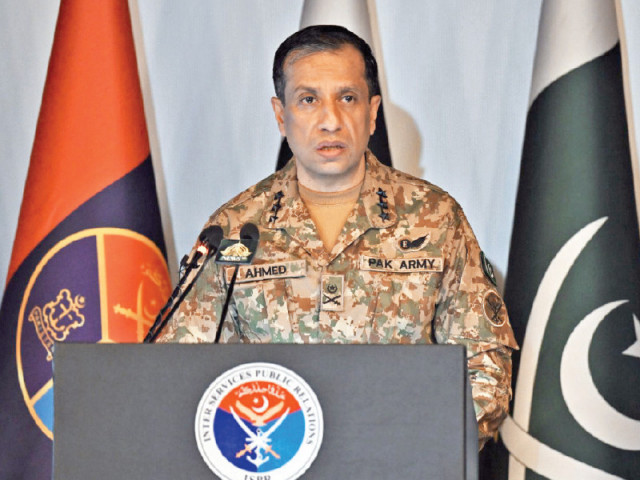ISPR unmasks India's state-sponsored terror
Lt Gen Chaudhry says Indian-trained terrorist arrested

The military on Tuesday provided evidence of India's state-sponsored cross-border terrorism in Pakistan, particularly Balochistan, announcing the arrest of an Indian-trained Pakistani citizen, and recovery of an Indian drone and improvised explosive device (IED) from him.
Lt-Gen Ahmed Sharif Chaudhry, the director general of the Inter-Services Public Relations (ISPR), rejected India's baseless accusations following the Pahalgam attack and noted that India had not provided a single shred of evidence to substantiate its baseless allegations against Pakistan.
Addressing an important press conference to inform the public about the current security situation in the country and address India's baseless allegation, the DG ISPR said that India was actively involved in spreading terrorism within Pakistan, operating and supporting terrorist networks on Pakistani soil.
Lt-Gen Chaudhry said that India had been found operating terror networks inside Pakistan, in which explosives, IEDs, and other lethal materials were being supplied to terrorists to target not only the security forces but also innocent civilians.
The DG ISPR said that on April 25, an arrest was made near the Jhelum bus stand. "A man named Abdul Majeed, who was reportedly trained in India, was taken into custody. Authorities recovered an IED, two mobile phones, and Rs70,000 cash from him," he added.
Further investigation led to the recovery of an Indian drone from his house, and Rs1 million in cash. "The handler was a junior commissioned officer of the Indian Army, Subedar Sukvinder," he said, adding: "The Indian officer had sent the IED and instructed the terrorist to collect it from a designated location."
"A forensic analysis of the recovered materials provided irrefutable evidence that could be examined by any credible, independent agency," he said. "This irrefutable evidence is just one small component of the broader pattern of state-sponsored terrorism being orchestrated by India," the DG said.
He said that soon after the Pahalgam attack, instead of carrying out an investigation, India had launched propaganda to malign Pakistan at the international level. "Such tactics were aimed at diverting attention from internal failures and upcoming political developments in India," he said.
"It has been seven days since the Pahalgam attack [in Indian Illegally Occupied Jammu and Kashmir (IIOJK)], yet not a single shred of evidence has been provided to substantiate the baseless allegations levelled against Pakistan," Chaudhry said.
Since last week, tensions have escalated between Pakistan and India after the latter's baseless allegations against Pakistan following the Pahalgam attack, which killed 26 tourists. Without providing any proof, India had accused Pakistan of the attack shortly after it happened.
India's foreign ministry had on Wednesday announced to hold the Indus Waters Treaty of 1960 in abeyance and close the Attari-Wagah border crossing. Pakistani nationals will no longer be able to travel to India under the Saarc visa exemption.
The Indian foreign ministry has also announced the recall of all of its defence attachés from Islamabad. It has maintained that the number of diplomatic staff would be reduced from 55 to 30, and has asked the military advisers in the Pakistani High Commission in New Delhi to leave the country within a week.
In a befitting response to the Indian aggression, Pakistan rejected the Indian announcement of holding the Indus Waters Treaty in abeyance, and closed its airspace to Indian flights. The decision was taken in the National Security Committee meeting chaired by Prime Minister Shehbaz Sharif in Islamabad.
The participants discussed the national security environment and the regional situation, particularly in the wake of the Pahalgam attack in the Anantnag district of IIOJK on Tuesday last.
The committee highlighted that the Indus Waters Treaty was a binding international agreement brokered by the World Bank and contained no provision for unilateral suspension. It said in a statement: "Water is a Vital National Interest of Pakistan, a lifeline for its 240 million people and its availability will be safeguarded at all costs".
The statement warned: "Any attempt to stop or divert the flow of water belonging to Pakistan as per the Indus Waters Treaty, and the usurpation of the rights of lower riparian will be considered as an Act of War and responded with full force across the complete spectrum of National Power".
(WITH INPUT FROM APP)























COMMENTS
Comments are moderated and generally will be posted if they are on-topic and not abusive.
For more information, please see our Comments FAQ